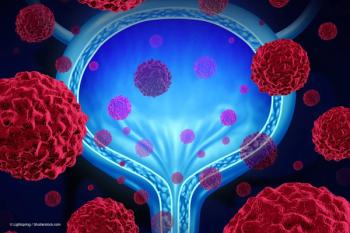
The FDA has approved 2 poly (ADP-ribose) polymerase (PARP) inhibitors for men with metastatic castration-resistant prostate cancer who have certain genetic mutations, marking the first approvals of this newer drug class in prostate cancer.

The FDA has approved 2 poly (ADP-ribose) polymerase (PARP) inhibitors for men with metastatic castration-resistant prostate cancer who have certain genetic mutations, marking the first approvals of this newer drug class in prostate cancer.

Misinformation about prostate cancer is rampant online and significantly impacts patient care, study authors said at an American Urological Association press briefing. Researchers using machine learning have taken what they say is a first step to help vet the quality of online content.

Data from a large registry showed that active surveillance for small renal masses was safe and noninferior to primary intervention at 10 years. In this video, senior author Phillip M. Pierorazio, MD, of Johns Hopkins University discusses results of the study presented as part of the AUA 2020 Virtual Experience.

In this interview, Leonard G. Gomella, MD, discusses the increasingly important role genetic testing plays in prostate cancer, current obstacles to testing, and when and how it will be carried out.

Kevin McVary, MD, of Loyola University Medical Center in Maywood, IL, provides urologists with tips on how to assess the adoptability of minimally invasive surgical therapies for BPH.

Martin Gleave, MD, of the University of British Columbia in Vancouver, discusses the Genomic Umbrella Neoadjuvant Study (GUNS) trial, which uses a multi-arm, multistage adaptive design to test targeted therapies in patients with high-risk localized disease by matching neoadjuvant therapies to baseline genomic alterations.

The developer of a leading telemedicine platform and a health care staffing agency have teamed up in a pilot program to provide clinical and emergency tele-urology services across the United States.

In a study of circulating tumor cells (CTCs) in metastatic genitourinary cancer patients, shorter survival was associated with high CTC counts at baseline and on therapy, specific CTC morphologic subtypes, PD-L1-positive CTCs, and low percent CD4 and percent CD8 T-cells. Heather Chalfin, MD, discusses the data and explains how CTCs may offer an advantage over other forms of liquid biopsy.

The FDA has approved the anti-PD-1 therapy pembrolizumab (KEYTRUDA) as monotherapy for the treatment of patients with Bacillus Calmette-Guerin-unresponsive, high-risk, nonmuscle-invasive bladder cancer with carcinoma in situ with or without papillary tumors who are ineligible for or have elected not to undergo cystectomy.

The FDA has granted accelerated approval to enfortumab vedotin-ejfv (PADCEV) for the treatment of adults with locally advanced or metastatic urothelial cancer who have previously received a PD-1/L1 inhibitor and a platinum-containing chemotherapy before or after surgery or in a locally advanced or metastatic setting.

The FDA has approved a supplemental New Drug Application or enzalutamide (XTANDI) for the treatment of patients with metastatic castration-sensitive prostate cancer.

Declining reimbursement for their work and the burden of prior authorization are nearly universal concerns of U.S. urologists, an exclusive Urology Times survey has found.

November 2019 proved to be a fruitful month for urology-specific FDA approvals, with the agency giving the green light to a new drug for complicated urinary tract infection, an implantable device for the treatment of overactive bladder/retention, and a digital product for strengthening of pelvic floor muscles and treatment of urinary incontinence in women.

Jeb Bush touched on a range of issues in health care and politics and shared a few personal anecdotes about his famous family with LUGPA members at the association’s annual meeting in Chicago.

A two-part grant is designed to provide guidance on gaps in existing guidelines on the management of advanced prostate cancer, Neal D. Shore, MD, reported at the LUGPA annual meeting in Chicago.

Urologists face a significant risk of on-the-job pain and injury, an exclusive Urology Times survey has found.

"Based on their lines of questioning, it was apparent the defendant’s attorney wanted me to sit on the jury and the plaintiff’s attorney did not," writes Urology Times Content Channel Director Richard R. Kerr.

A pivotal phase II trial of a novel MRI-guided ultrasound ablation treatment exceeded its primary efficacy endpoint of PSA decline in men with organ-confined prostate cancer.

In advance of this year’s AUA annual meeting, Urology Times asked members of our editorial board to choose the top presentations in their subspecialty.

More than one-fourth of urologists say they have specific plans to retire within the next 2 years. An ongoing drop in reimbursement, feeling burned out, and government mandates are the primary factors affecting when they will retire, according to the 13th annual Urology Times State of the Specialty survey.

Changes in the Medicare fee schedule, including plans to pay essentially the same amount for services whether performed in a hospital provider-based department (PBD) or in individual physician offices, were hailed as “significant wins” in a Health Policy Forum at the 2018 LUGPA annual meeting in Chicago.

At 10th anniversary meeting, Neal D. Shore, MD, discusses what has made LUGPA “decidedly unique” from other urologic associations.

Even though patients with muscle-invasive bladder cancer and significant comorbidity are likely to benefit from bladder-sparing treatment approaches, increasing comorbidity burden appears to have no correlation with receiving such treatments.

New research may pave the way for a form of nerve stimulation for refractory overactive bladder that is home based and less invasive than current neuromodulation approaches.

In this interview Mark A. Preston, MD, MPH, of Brigham and Women’s hospital sat down with Richard. R. Kerr, Urology Times content channel director, to discuss the association between obesity and incidence of total and fatal renal cell carcinoma in two prospective cohorts. The interview was conducted during the AUA annual meeting in New Orleans.

Patients with interstitial cystitis/bladder pain syndrome who have low bladder capacity have a significantly different gene expression profile than both IC/BPS patients with normal bladder capacity and those without the condition, researchers reported in a recently published pilot study.

In our “Best of AUA” report, Urology Times’ editors and writers present the AUA annual meeting’s take-home messages in 15 therapeutic areas.

Wassim Kassouf, MD, CM, presents the take home messages on bladder cancer from the AUA annual meeting in Orlando, FL.

Jesse D. Sammon, DO, presents the take home messages on outcomes analysis from the AUA annual meeting in Orlando, FL.

Monish Aron, MD, presents the take home messages on kidney cancer from the AUA annual meeting in Orlando, FL.

Published: October 14th 2013 | Updated:

Published: October 21st 2013 | Updated:

Published: September 3rd 2013 | Updated:

Published: September 3rd 2013 | Updated:

Published: September 16th 2013 | Updated:

Published: September 16th 2013 | Updated: